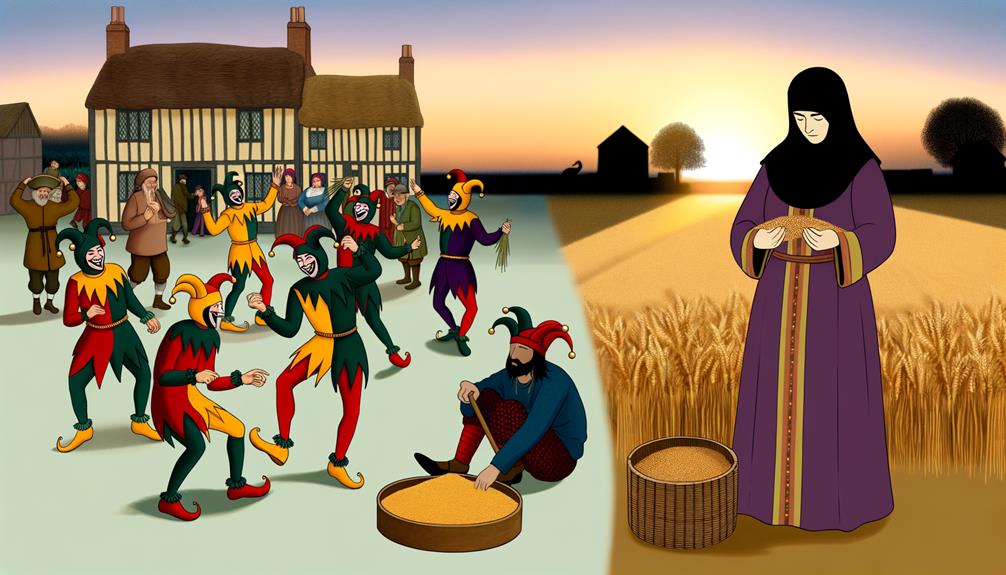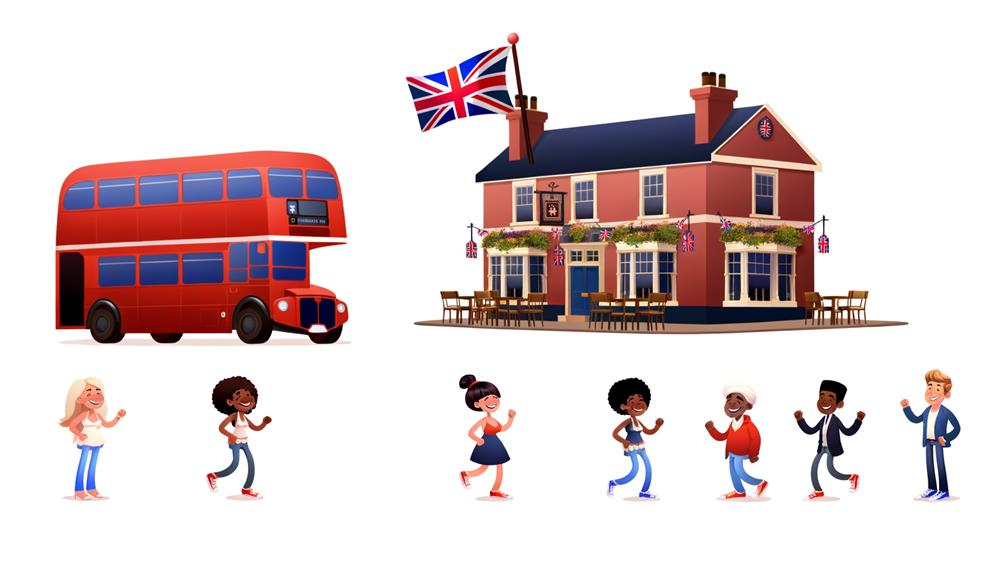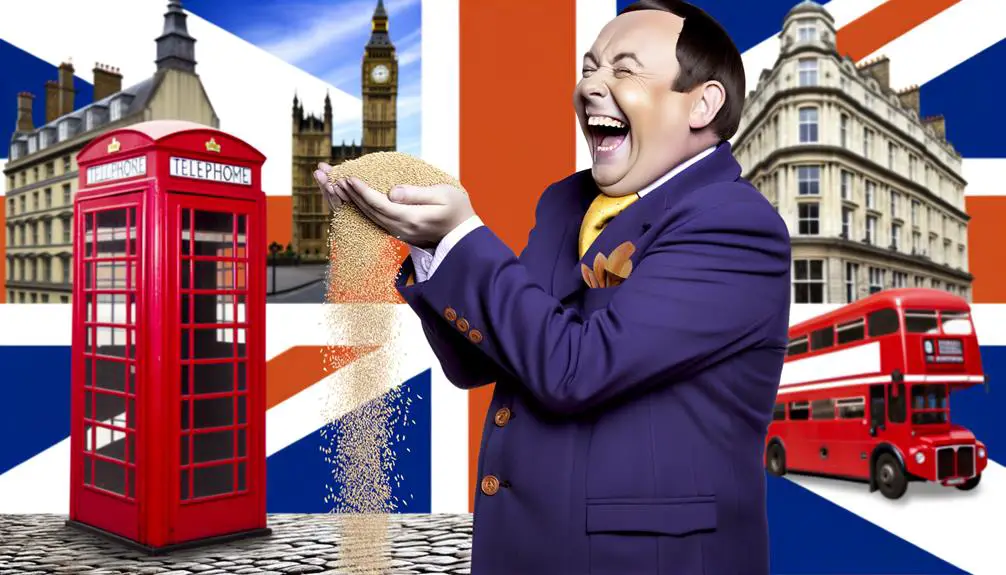In British slang, you'll find 'chaff' denotes more than its archaic origins of discarded corn husks. It's metamorphosed, underpinning playful teasing that's deeply embedded within the cultural lexicon. This metamorphosis mirrors broader sociolinguistic dynamics, showcasing linguistic plasticity and adaptability. Across different regions, 'chaff' carries nuances, from Northern England's light-hearted banter to London's cheeky disrespect, reflecting diverse societal norms and attitudes. Understanding this term offers a window into the complexities of British slang, its regional identities, and the value placed on humor and wit. Exploring its multifaceted usage unveils its significance within contemporary communication, hinting at the layers of meaning that await your discovery.
Key Takeaways
- In British slang, 'chaff' means to jest or tease in a friendly manner.
- It's rooted in the British social fabric, emphasizing camaraderie and wit.
- 'Chaffing' can vary in meaning across regions, reflecting local linguistic identities.
- The term is often used in a light-hearted context, establishing a sense of community.
- It's amplified by social media, showcasing its adaptability and modern relevance.
The Origins of 'Chaff'

Tracing back through the annals of British history, it's discovered that the term 'chaff' originally stems from a Middle English word denoting the husks of corn or other seed separated by winnowing or threshing, evolving metaphorically in language to convey notions of worthlessness or insignificance when applied to conversation or people. This semantic shift highlights the etymological roots deeply embedded in agricultural practices, which were central to medieval life. It exemplifies how linguistic elements can metamorphose over time, reflecting changes in societal values and practices.
Upon delving deeper, one finds that 'chaff' serves as a fascinating case study in linguistic comparisons. In its journey from a concrete description of agricultural refuse to a metaphorical symbol of triviality, 'chaff' mirrors similar evolutions in other languages where terms rooted in the physical world acquire abstract meanings. This phenomenon underscores the universality of linguistic evolution, where words stretch beyond their initial confines to embrace new, often more nuanced significances. Such transformations are not merely incidental but are indicative of the dynamic interplay between language, culture, and societal shifts, offering insights into how people historically conceptualized value and waste.
'Chaff' in Historical Context
Delving into the historical context of 'chaff,' it's evident that this term's journey from agricultural by-product to a metaphor for triviality is deeply intertwined with societal transformations in Britain. Initially, 'chaff' referred to the husks of corn or other seeds separated by winnowing or threshing, a by-product of agricultural practices. This physical separation of wheat from chaff became emblematic of discerning value, distinguishing the essential from the worthless.
As Britain evolved, so did the application of 'chaff.' The term began to symbolize not only physical detritus but also the metaphorical separation of what is considered valuable from what is not in various aspects of life. This metaphorical leap was significant, embedding 'chaff' deeply into the cultural lexicon.
Moreover, the introduction of 'chaff' into military vernacular as a term for radar-confusing decoys showcases its adaptability. These military decoys, used to distract enemy radar, metaphorically separated the 'wheat' (the actual military targets) from the 'chaff' (the decoys), further cementing the term's role in distinguishing between what is genuine and what is mere distraction. This evolution reflects a broader societal shift towards more abstract and strategic thinking, illustrating how language adapts to new technologies and practices.
Modern Meanings and Usage

As you shift from the historical context to the contemporary landscape of 'chaff' within British slang, it's important to trace its origin and evolution to understand its resilience in modern lexicon. Exploring common expressions reveals how 'chaff' functions not only as a vestige but as a vibrant component of everyday language, enriched by its adaptability and nuanced meanings. The cultural significance today underscores its role in shaping, and being shaped by, the dynamic fabric of British society, offering insights into linguistic persistence and change.
Origin and Evolution
The term 'chaff,' in its journey through British slang, has evolved significantly, reflecting changes in societal attitudes and linguistic practices. Its linguistic roots anchor deeply in the vernacular of the past, where it initially referred to the act of jesting or teasing. Over time, the nuances of 'chaff' have shifted, mirroring broader linguistic trends and the influence of comparative slangs from other English-speaking regions. This evolution underscores the fluid nature of language and slang's role in encapsulating the zeitgeist of an era.
- Linguistic roots: The foundation of 'chaff' in historical dialects and colloquial speech.
- Comparative slangs: Influence from other English dialects and slangs.
- Societal attitudes: Reflection of changing social norms and values.
- Linguistic practices: Adaptation within different contexts and communities.
- Zeitgeist encapsulation: 'Chaff' as a mirror to the era's spirit and attitudes.
Common Expressions Explained
Building on its historical evolution, 'chaff' in modern British slang encompasses a range of expressions that reflect current linguistic trends and social dynamics. This metamorphosis highlights the adaptive nature of language, where 'chaff' has shifted from its original meanings to embody new, nuanced expressions within various contexts. The impact of slang metamorphosis on the English language is profound, as it not only mirrors societal changes but also influences communication patterns. By examining 'chaff' in its contemporary usage, one can discern the intricate ways in which slang shapes and is shaped by the social environment. This analysis underscores the significance of understanding slang within its cultural and temporal frameworks to fully appreciate its role and impact on language. Through 'chaff,' we witness the dynamic interplay between language and society, illustrating the ever-evolving nature of human communication.
Cultural Significance Today
In today's cultural landscape, 'chaff' embodies a myriad of modern meanings and usages that reflect the nuanced interplay between language evolution and societal dynamics. This evolution is indicative of the broader patterns of linguistic diversity and the social implications inherent in the ways we communicate.
- *Reflects changing social norms and values:* The term adapts to mirror contemporary societal attitudes.
- *Showcases linguistic innovation:* Demonstrates how language evolves to accommodate new ideas and concepts.
- *Marks generational shifts in language:* Highlights how different age groups adopt and adapt slang.
- *Indicates regional linguistic identities:* Reveals how specific areas develop unique uses for common terms.
- *Embodies the dynamic nature of communication:* Illustrates the fluidity of language in response to changing social landscapes.
'Chaffing': The Action Explained

Understanding 'chaffing' requires an appreciation for its nuanced role within British slang, where it's typically employed to denote playful teasing or mocking in social interactions. This linguistic practice, deeply rooted in the social fabric of British culture, serves as a means of establishing camaraderie or showcasing wit among peers. However, the onset of social media trends has amplified the visibility of 'chaffing', propelling it beyond intimate circles into the public domain. This increased exposure has occasionally led to 'chaff injuries', a metaphorical term denoting the emotional or psychological impact that such mocking can inflict when boundaries are overstepped or the jest is taken too far.
| Aspect | Analysis |
|---|---|
| Social Media | Amplifies 'chaffing'; broadens audience beyond immediate social circles. |
| Chaff Injuries | Emotional/psychological impact from excessive or harsh 'chaffing'. |
| Camaraderie | Initially, a means to strengthen bonds and showcase wit among friends. |
| Public Domain | Onset from private jest to widespread social media phenomenon. |
| Boundaries | Importance of recognizing limits to avoid causing unintended harm. |
In this context, 'chaffing' transcends its conventional boundaries, evolving into a complex social interaction that mirrors the broader dynamics of communication and relationships in the digital age.
Regional Variations of 'Chaff'
How does 'chaff' vary in meaning across different regions within the UK, reflecting the diverse linguistic landscapes and cultural nuances that characterize this nation? Dialect comparisons and slang differentiation shed light on how a seemingly uniform term can acquire unique dimensions, dependent on its regional context. The exploration into the regional variations of 'chaff' offers a fascinating glimpse into the dynamic nature of British slang, where geographical boundaries delineate linguistic identities.
- Northern England: Here, 'chaff' can often mean to jest or tease in a friendly manner, emphasizing the region's penchant for light-hearted banter.
- Scotland: The term might not be as prevalent, but when used, it leans towards describing a type of verbal sparring, highlighting the Scots' love for witty and intellectual exchanges.
- London: In the capital, 'chaff' might be more associated with a cheeky form of disrespect, mirroring the city's brash and bustling energy.
- Wales: Usage of 'chaff' is rarer, but when it appears, it tends to signify a form of playful mockery, reflecting the communal and tight-knit societies.
- Southwest England: Here, 'chaff' might morph to mean a more specific type of teasing, often related to one's origins or local affiliations, showcasing regional pride and identity.
Through these dialect comparisons and slang differentiation, 'chaff' exemplifies the linguistic richness and diversity within the UK.
'Chaff' in Popular Culture

The term 'chaff' has woven its way into popular culture, reflecting societal attitudes and linguistic evolution that are as dynamic and diverse as the regions from which they spring. This incorporation manifests most visibly in the domain of chaff memes and instances of celebrity chaffing, which serve as a barometer for the term's fluctuating relevance and interpretation within the public lexicon. Through the lens of chaff memes, one observes not merely a humorous reflection on everyday life but a sophisticated commentary on social dynamics, leveraging the vernacular to critique, satirize, or celebrate contemporary issues. These digital artifacts encapsulate the essence of chaff's multifaceted identity, bridging gaps between disparate social groups through shared laughter and recognition.
Moreover, the phenomenon of celebrity chaffing underscores the term's permeation into the echelons of high visibility. When public figures engage in or become the subjects of chaffing, it elevates the term's status from colloquial banter to a remarkable element of pop culture dialogue. This interaction between celebrities and the slang term not only amplifies its reach but enriches its contextual applications, providing insights into the dynamics of fame, identity, and community. Through these lenses, chaff emerges not as mere slang but as a vibrant, evolving component of cultural discourse.







